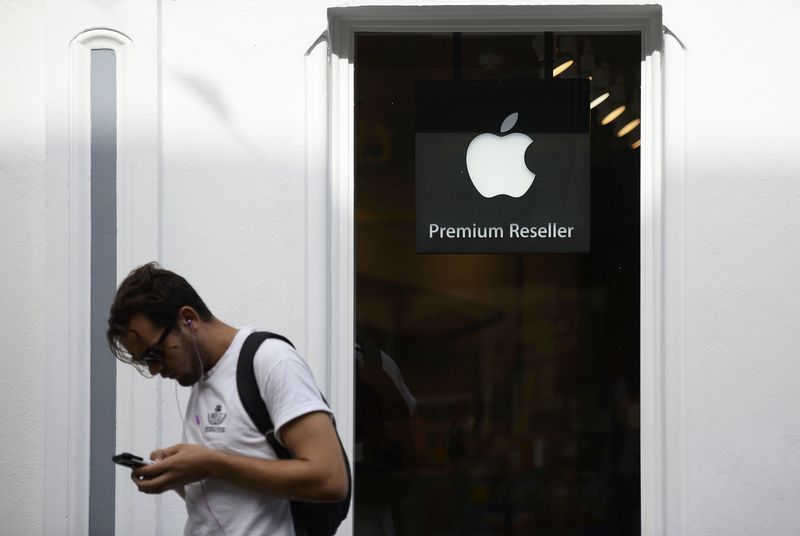Intel stock spikes after report of possible US government stake
Apple (NASDAQ:AAPL) stock closed 4% lower at $171.3 after the Department of Justice (DOJ) unveiled its long-anticipated lawsuit against the iPhone maker for violating antitrust regulations. AAPL remains one of the Magnificent Seven laggards in 2024, losing 11% year-to-date, while the broader S&P 500 gained roughly 10% during that period.
DoJ sues Apple
On Thursday, the Department of Justice filed a lawsuit against Apple, accusing the company of monopolizing the iPhone ecosystem, which has significantly contributed to its “astronomical valuation” at the cost of consumers, developers, and competing phone manufacturers.
The suit sent Apple stock lower on Thursday.
A Justice Department official mentioned during a briefing call that if the U.S. government prevails, they are considering structural relief which could include breaking up the company.
The lawsuit alleges that Apple's anti-competitive behavior is not limited to its iPhone and Apple Watch lines but also affects its advertising, browser, FaceTime, and news services.
“Each step in Apple’s course of conduct built and reinforced the moat around its smartphone monopoly,” the DOJ said in its lawsuit, which also involves 16 attorneys general in New Jersey federal court.
If successful, breaking up Apple would mark a rare application of the Sherman Act, not seen since the Bell System's dissolution in 1982.
The DOJ accuses Apple of maintaining its iPhone sales by hindering cross-platform messaging apps, restricting compatibility with third-party wallets and smartwatches, and obstructing non-App Store programs and cloud streaming services.
This lawsuit poses a significant threat to Apple's closely guarded ecosystem. The company argues that regulatory compliance is costly, could limit its ability to launch new products or services, and might reduce consumer demand.
A court ruling against Apple could lead to major changes in its key revenue sources: the iPhone, which generated over $200 billion in sales in 2023, the Apple Watch, a cornerstone of its $40 billion wearables sector, and its growing services division, which reported $85 billion in revenue last year.
Analysts discuss Apple stock outlook
Following the lawsuit’s unveiling, multiple Wall Street analysts voiced their comments on its potential effects on Apple's stock and operations.
HSBC: “If the DoJ proves its case, we think it could lead to Apple changing the way it operates, as happened in Europe. New regulation (the Digital Market Act, adopted in March 2024) forced Apple to dramatically change its App Store terms and conditions. These include the possibility for developers to distribute apps on alternative app market places or enable NFC technology in banking and wallet apps in the region.”
Evercore: “Structurally, we think a core challenge is perhaps that current anti-trust law focuses on quantifiable market definitions. We continue to think any meaningful anti-trust action against Apple in the US will require new legislation from Congress as existing laws make it very difficult to argue Apple operates a monopoly using market definitions or consumer harm standards.”
Bernstein: “While the DoJ’s charges are focused on iPhone, we do not see likely remediation as materially impacting Apple financially or undermining the iPhone franchise: worst case, Apple pays a fine, and loosens restrictions for competition across the iOS platform, which we believe will have limited impact on iPhone user retention or on Services revenues. The downside risk for Apple could be that courts ultimately mandate that hardware competitors have equal access to Apple’s APIs and ecosystem. While we see limited impact to more mature markets that Apple already dominates (smartphones, tablets), it could certainly level the playing field for new device market.”
Morgan Stanley: “While we understand the logic behind the lawsuit, it's also very clear that Apple's competitive moat is a result of its seamless integration of hardware, software, and services, which creates an unmatched closed ecosystem of hardware and solutions offerings. We would argue this is a function of unmatched innovation, rather than monopolistic practices, which ultimately benefits consumers.”
Wedbush: “Ultimately, we do not expect any business model changes for now as this case will likely take years in the courts to litigate and lead to a conclusion, but Apple clearly has to find a way to eventually settle this case, pay a hefty fine, and ultimately find some compromise with developers on the App Store structure down the road.”
